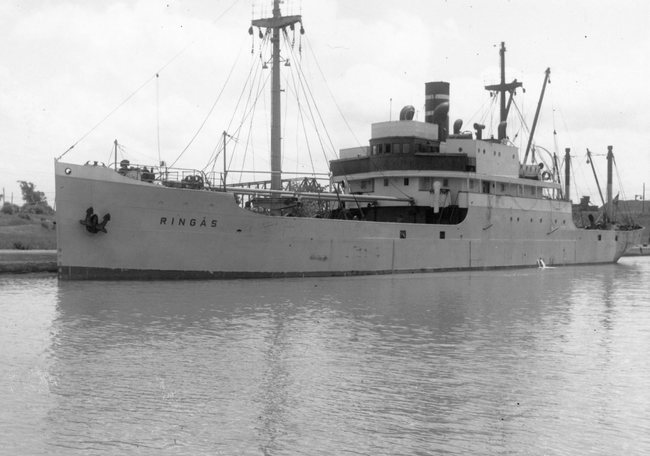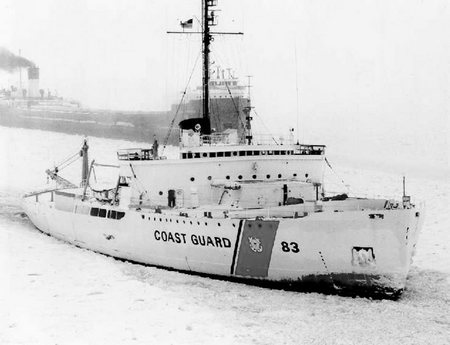Shipwreck: Francisco Morazon
by Skip Gilham, Vineland, Ontario, CanadaBy the time the St. Lawrence Seaway opened in 1959 the Francisco Morazon was an old ship. It had been built in 1922 and had sailed under seven previous names, serving throughout World War II as a German and then as a British flag freighter.
The vessel was constructed by Deutsche-Werft at Hamburg, Germany, in 1922 and it went to work for the well-known Hamburg-America Line as Arcadia. The 246-ft, 9-in long by 36-ft, 10-in wide vessel provided fast service for that era and was particularly efficient working in shallow draft harbors.
The ship was renamed Elbing in 1934 and re-powered the next year with a 4-cylinder steam turbine engine. It was on the Nazi side in the early years of the World War II but was confiscated by the British as a war prize in 1945 and operated for the British War Ministry as Empire Congress.
Once peace was established, the British assigned this ship to an allied firm that had suffered many war losses. The 1,442 gross-ton freighter joined Kr. Jebsen of Norway and resumed sailing as Brunes. This was changed to Skuld in 1947 and Ringas by Ekerholts Rederi A/S of Norway in 1948.
For the thirty years prior to 1952, this vessel had traded on deep sea routes, but Ringas came to the Great Lakes that year delivering china clay to Muskegon, Michigan. The vessel is shown in the Welland Canal.
Ringas returned the next year with pulpwood and general cargo and made a stop at Port Huron, MI. It was back on the Great Lakes in 1956 and returned again as Los Mayas in 1958. By now the ship was owned by Moa Navigation S.A. and was registered in Panama. Los Mayas hit bottom during a return visit to Muskegon in 1958 and began to leak. A cement patch was required to allow the ship to continue its voyage.

The Francisco Morazon as the Vessel Ringas (1953)
In 1959, the ship moved under the management of Inter-American Marine Operators of New York, and it was registered in Liberia as Francisco Morazon. Now registered at 1,407 gross tons, the ship headed through the newly opened St. Lawrence Seaway in 1959 for the Canadian Lakehead ports of Port Arthur and Fort William (now known as Thunder Bay).
Francisco Morazon’s last trip included a stop at Toronto to unload phosphate late in 1960 and then on to Chicago to load 1,118.5 tons of freight for Hamburg and Rotterdam. This latter payload consisted of hides, canned chicken, lard, scrap metal, phosphate, gilsonite, tinplate, aluminum, solder dross, machinery, chemicals, castings, bottle caps, toys and baled hair. The shipment was valued at $300,000.
The ship set out for the sea during the overnight hours of November 27, 1960. Onboard was the Greek Captain, his wife, and 14 crew members who represented four nationalities.
Francisco Morazon encountered fog on Lake Michigan, and speed was reduced on the northerly journey. Calculating the distance traveled in these conditions was not easy, and the Captain mistook his ship’s position. A problem with the feed pump required a stop for repairs, and now the race to exit the Great Lakes before the system closed on December 3 became a concern.
A storm on November 28 pounded the aging freighter, but they pushed on and were soon off course. Thick snow made matters worse and visibility was near zero. Off course and unable to see, the Francisco Morazon landed on the rocks 300 yards off South Manitou Island at 6:35 p.m. on November 29. Efforts to refloat the wounded freighter were not successful, and the storm drove the hull closer to shore.
Help arrived from the United States Coast Guard with the Sundew and Mesquite dispatched to the scene. Ten to twelve foot waves battered the shore; the Captain’s wife, two months pregnant, was airlifted to the USCG Mackinaw.
There was no let up in the storm and several leaks developed due to holes and cracks, and, on December 4, the crew was removed.
Efforts to refloat the ship failed, and, in time, some of the cargo was salvaged. The hull has been pounded by subsequent storms and suffered from vandal fires. Today it bears little resemblance to the freighter that stranded 46 years ago this fall.

Coast Guard IcebreakerMackinaw used in rescue operations for the Francisco Morazon. Image courtesy of the US Coast Guard Historic Photo Gallery. http://www.uscg.mil/hq/g-cp/ history/Icebreaker_Photo_Index_1.html
